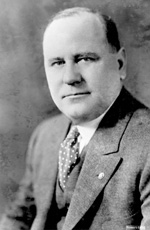Get Today in Masonic History into your Inbox. Sign up today for one of our email lists!
Need an article for your Trestleboard/Newsletter see our Use Policy
Bennett Champ Clark is Born

Today in Masonic History Bennett Champ Clark is born in 1890.
Bennett Champ Clark (a.k.a. Joel Bennett Clark) was an American politician.
Clark was born on January 8th, 1890 in Bowling Green, Missouri. He graduated from the University of Missouri in 1912 with a Bachelor of Arts. After, he earned a Bachelor of Laws from George Washington University.
In 1913, Clark became parliamentarian of the United States House of Representatives where he was consulted by leaders in the House on matters of procedure as it relates to the United States Constitution. In 1917, he served in World War I as a colonel in the United States Army. After coming home in 1919, Clark opened up a private practice in St. Louis, Missouri.
In 1932, Clark was elected to serve in the United States Senate where he served to two terms until 1945. In 1943 a confidential analysis by a British scholar of the Senate Foreign Relations Committee for the British Foreign Office states about Clark:
a rabid isolationist and member of the American First Committee who has steadily voted against all the foreign policies and war measures of the Administration with the exception of the reciprocal trade agreements (in which the corn exporters of Missouri have some interest). A member of the Wheeler-Nye-[Robert A.] Taft coterie. An avowed Anglophobe
Along the same view Clark is most famous for declaring on the Senate floor Emperor Hirohito needed to be hung as a war criminal in 1944.
Also in 1944, the United States Congress began working on the G.I. Bill. One of the chief debates was whether servicemen who received "blue discharges", now known as an Other than Honorable Discharge, should still receive the benefits provided in the bill. Rear Admiral Randall Jacobs testified before Congress saying allowing people who received "blue discharges" to receive benefits undermined the integrity of the United States military taking away incentive for people to behave properly. This caused Clark to respond by saying:
The Army is giving Blue discharges, namely discharges without honor, to those who have had no fault other than they have not shown sufficient aptitude for military service. I say that when the government puts a man in the military service and, thereafter, because the man does not show sufficient aptitude gives him a blue discharge, or a discharge without honor, that fact should not be permitted to prevent the man from receiving the benefits to which soldiers are generally entitled.
In 1945, President Harry S. Truman appointed Clark to the United States Court of Appeals for the D.C. Circuit. He held the position until he passed away on July 13th, 1954.
Clark was a member of Phoenix Lodge No. 136 in Bowling Green, Missouri.
This article provided by Brother Eric C. Steele.
| S | M | T | W | T | F | S |
| 1 | 2 | 3 | 4 | 5 | 6 | 7 |
| 8 | 9 | 10 | 11 | 12 | 13 | 14 |
| 15 | 16 | 17 | 18 | 19 | 20 | 21 |
| 22 | 23 | 24 | 25 | 26 | 27 | 28 |
| 29 | 30 | 31 | ||||
Other Events Today
Jacob Collamer is Born
Rex David "Dave" Thomas Passes Away
Prince Albert Victor, Duke of Clarence and Avondale is Born
Llewelyn Sherman Adams is Born

